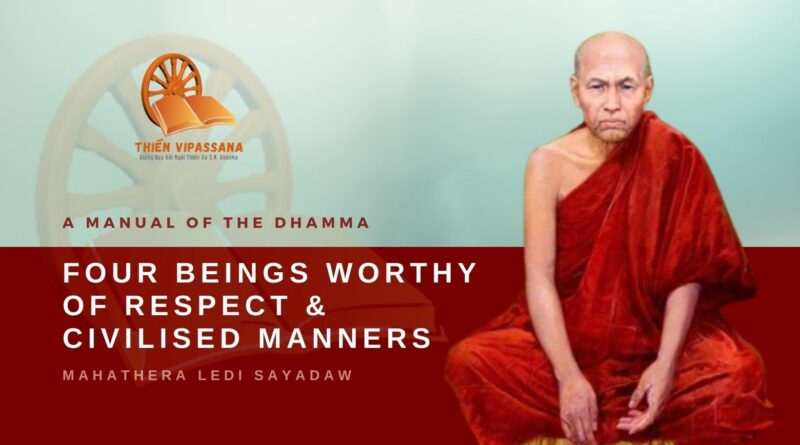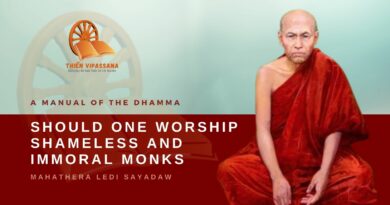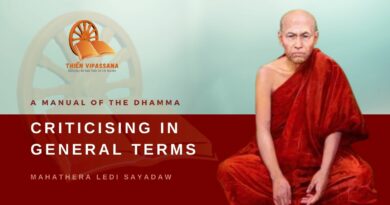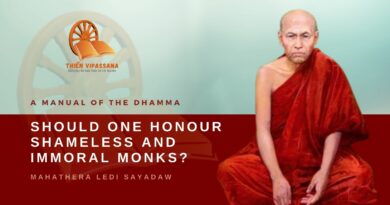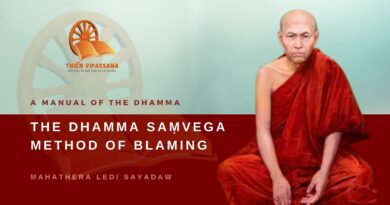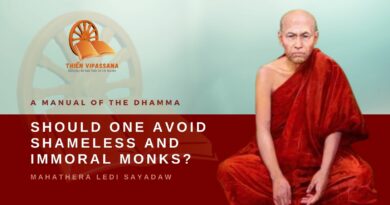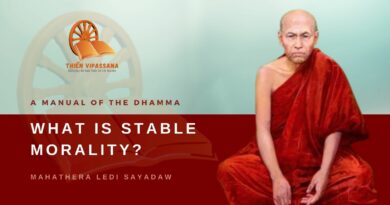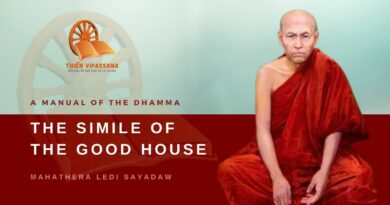Four Beings Worthy of Respect
One must show respect to a poisonous snake, a monarch with his retinue, a monk of good moral conduct, and a fire. By respecting these four, one acts in a civilised manner, that is, by showing due respect.
The essential points for treating each of them properly are as follows:
- A poisonous snake must be treated with respect to avoid getting bitten.
- A monarch, being a sovereign power, must be treated with reverence and respect, so that no danger may arise from him.
- A scrupulous monk, because of his power, must be treated with reverence and respect. If not, danger may arise due to unwise association with him. In the past King Kalabu, King Dandaki, King Nālikera, King Ajjuna, etc. treated such monks with disrespect. So they suffered danger and harm leading to ruin.
- Everybody must take care with fire because heedlessness may lead to serious accidents. Fire must be given due regard so that one can live safely.
All such wise, respectful attitudes amount to civilised manners. Among the above four, a snake, fire, and a monarch can cause harm at once. A scrupulous monk will not harm others. However, maltreatment and disregard by the laity bring great harm to them in the long term, so a scrupulous monk must be treated with respect.
The above canonical text gives clear guidance for all to be respectful and take heed with those who can cause harm and danger. One must try to avoid danger, and treat these four with circumspection.
The words “harm and danger” and “fear” in this case also convey the meaning of making unwholesome kamma, the arising of evil thoughts in one’s own mind, and a wrong attitude that one may maintain. So in dealing with others, especially immoral monks, if one does not show respect, one will entertain unwholesome thoughts and do unwholesome deeds, and so unwholesome states increase in one’s character. This is a grave danger to be avoided. With this in view one must pay respect to an immoral monk, following the injunction to have civilised manners. So by remembering this text and doing respectful deeds even to an immoral monk, it can be classified as the blessing of worshipping the Dhamma. Paying respect in a proper way, such as treating with civility, greeting with hands held in añjali, thus exhibiting cultured behaviour, are also the good deed of civilised manners.
However, by treating an immoral monk with a skilful attitude and civilised manners, one will not attain the three refuges. This is because an immoral monk is not a genuine member of the Saṅgha, not a true monk. This disadvantage means that a layman fails to get a reliable refuge by worshipping him as an individual. However if the Saṅgha selects an immoral monk to receive alms, and if the lay person’s mind is directed to the Saṅgha, the lay person will obtain the three refuges. In this case the recipient becomes the Saṅgha and the donor is offering his food to the community of monks. So one gets a reliable refuge due to the right motive.
In making offerings to scrupulous or shameless monks, the benefits differ. In paying respects too, the advantages differ. The difference being that one monk is scrupulous while the other is shameless. However, in both cases a layman can obtain the blessings of reverence and honouring the worthy if his motive is noble. This is a good action for him.
Civilised Manners
The behaviour of King Kosala shows that one should follow the advice to show civilised manners to all types of persons. All persons should be treated with due respect.
One day, while King Kosala was attending on the Buddha in the Jetavana monastery, some heretics happened to pass through the precincts. When the king saw them he mentioned his name and made obeisance to them in a proper manner. Why did he, a true disciple of the Buddha, do obeisance and express reverence to the heretics? The Commentary on the Kosala Saṃyutta explains that if the king did not show these civilities, the heretics would have borne a grudge against him. They would have thought that the king paid respects only to the Buddha. Being neglected, they could cause trouble for the king. So the king paid homage to them out of courtesy and to avoid possible harmful effects in his country. This homage paid by the king is in accordance with the Maṅgala Dhamma and the injunction to show civilised manners, which means to treat all with due respect.
The other reason for the king’s conduct was due to State Policy. In his kingdom there were numerous followers of these heretical teachers. If these people knew that the king had neglected and slighted their teachers, they might create disunity or instigate rebellion. To unify his country, the king worshipped these sectarians and heretics for the sake of national unity. This was done to give peace and happiness to a large number of believers of other sects. This is also an auspicious deed.

